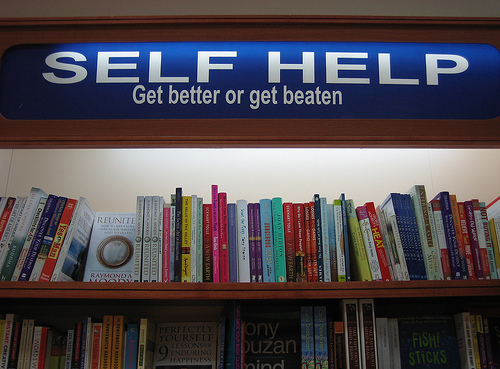We all want to live better.
In a culture awash with self-improvement jargon, does living better mean being better at living? Or, is our implementation of Eastern spirituality towards obsessive self-improvement making us delusional?
All over the internet, complex spiritual ideas are being distilled down to their most self-helpish elements and organized into easily digestible lists about how to improve our lives.
No matter how much we claim to be concerned with mindfulness, the pervasiveness of self in our “mindfulness” media is undeniable: your good or bad relationships, your diet, your yoga practice, your inner goddess, your creative flow, your homeopathic UTI treatment, your coping mechanisms, your sexuality…the list goes on forever, literally.
There is no end to the articles that could be written about how to improve ourselves, because self-improvement is like a Russian nesting doll that never gets too small to open.
This is not to trivialize the existence of gremliny demons in our beloved first world. Depression, anxiety, shame and stress are all real afflictions that Eastern spirituality has legitimate tools to address. This is to say that our media is pretending to implement these tools, while: a) presenting us with an endless task and b) making us more narcissistic and delusional.
Mindfulness, in truth, is about deflating the ego. Mindfulness is also an awareness of our interconnectedness not just with people we know, but also with everything that lives and breathes on this planet. Awareness of privilege is a fundamental cornerstone of mindfulness, and that is where we as a culture are falling short. Like, way short.
Here’s a quick look at what’s going on with our fellow sentient beings while we are instagramming ourselves in yoga poses: 80% of the planet is living on 10 dollars a day or less; 22,000 children die each day from poverty; 1.1 billion people in developing countries have inadequate access to water; 1.8 million child deaths each year are a result of diarrhea; at least 10,000 animal species go extinct every year; over 200 Palestinian children have died as a result of Israeli military operations in the last three weeks…
The list is as about as endless as our lists of ways to live our own lives better and happier. Given these statistics, we can safely say that most people in the world don’t identify with phrases like, “everything happens for a reason.” If we are to be truly mindful, which means being connected—we can’t use those phrases ourselves. We also can’t describe things like a loose stone hitting our windshield and some road tar on our new shoes as characteristic of life’s suckiness. (Sorry, Jennifer S. White.)
What we can do is start generating and seeking out different kinds of lists. We need to change our dialogue to one of service, solutions, and accountability. We need to start addressing the first-world guilt that is choking us all. If we are to follow the path of mindfulness, then we know that we can only improve ourselves by shedding our delusions, looking our reality in the face, and finally beginning the work. That is, the work of pulling ourselves out of our hole of denial and self-absorption—together.
~
~
~
Love elephant and want to go steady?
Sign up for our (curated) daily and weekly newsletters!
Editor: Travis May











Read 3 comments and reply